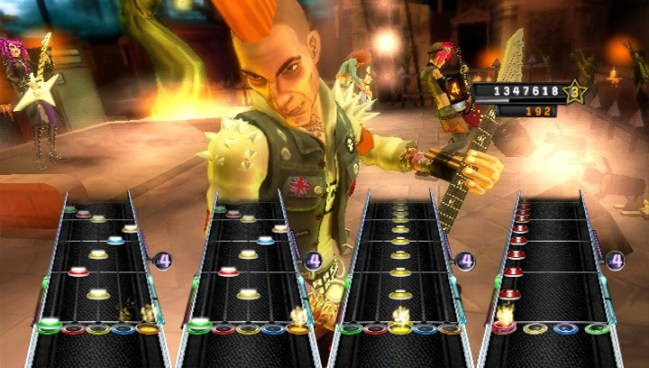
Well, that was fun while it lasted: After nearly six years of faux axe shredding, Activision Blizzard has decided to send its Guitar Hero franchise up a stairway to heaven.
“Due to continued declines in the music genre,” the video game publisher said in its December Quarter and Calendar Year 2010 Financial Results release, “the company will disband Activision Publishing’s Guitar Hero business unit and discontinue development on its Guitar Hero game for 2011…These decisions are based on the desire to focus on the greatest opportunities that the company currently has to create the world’s best interactive entertainment experiences.”
Activision will also discontinue production of True Crime: Hong Kong. So, sorry to all four of you who were looking forward to a sequel to that.
The decision to close shop on the Guitar Hero unit follows dismal holiday sales figures Guitar Hero: Warriors of Rock — the fourteenth iteration of the game. Activision also says its Guitar Hero games, once the most successful titles in gaming, were simply too expensive to produce — a taxing process that involved an endless string of licensing fees for music and the cost of manufacturing pricey items like giant plastic guitar and microphone controllers.
“In retrospect, it was a $3 billion or more business that everybody needed to buy, so they did, but they only needed to buy it once,” analyst Michael Pachter tells the Associated Press. “It’s much like Wii Fit. Once you have it, you don’t need to buy another one.”
The death of the music-centric video game seems to be a trend in the industry. Guitar Hero‘s demise follows Viacom’s unloading of Rock Band developer Harmonix late last year.
The disintegration of the Guitar Hero arm will require the loss of about 500 Activision jobs, the company says. (Activision Publishing employs about 7,000 people overall.) They also say, however, that those people will be replaced by new hires elsewhere in the company, which will refocus its efforts on social and online games.
That’s not to say Activision is doing poorly, by any means. The company also publishes Call of Duty: Black Ops, which had made a whopping $1 billion before the end of last year. As you probably already know, Activision Blizzard also publishes a little game franchise known as World of Warcraft. So, there’s always that.
Editors' Recommendations
- Call of Duty: Warzone is finally coming to mobile in March
- Fortnite Festival will leave you wishing for a real Rock Band revival
- Microsoft finally closes its $69B Activision Blizzard acquisition
- Activision teases Call of Duty: Modern Warfare III’s biggest improvements
- Microsoft wins FTC case, removing Xbox’s biggest Activision Blizzard acquisition hurdle


